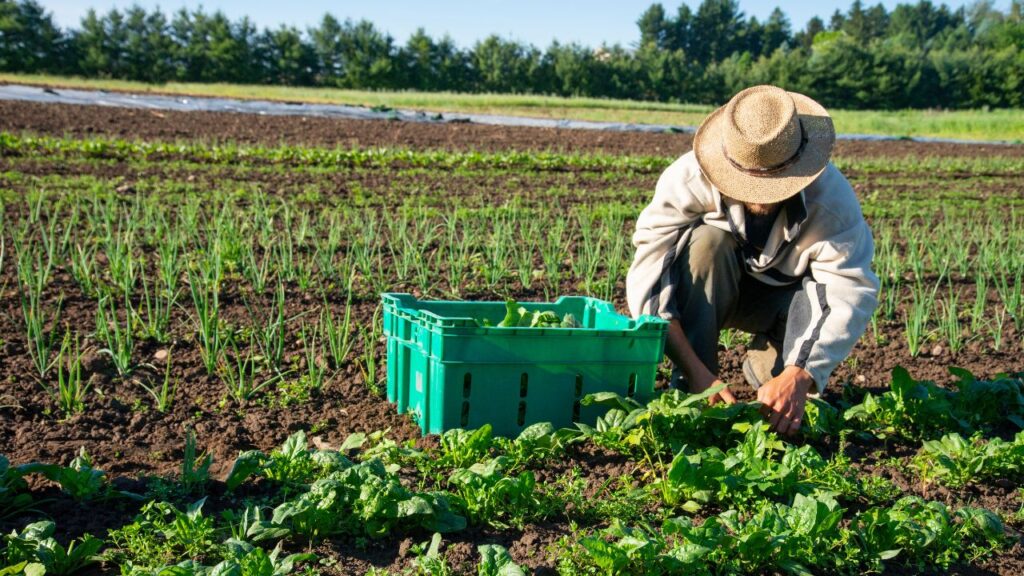How to Start an Organic Farm in Uganda. Starting an organic farm in Uganda is a journey driven by passion and fuelled by a dream.
Appreciating the field of agriculture, one may have this in his dreams but is concerned about how such a dream could be implemented, mainly when starting with little else. Not easy but possible!
However, with nothing but a dream as a starting point, it is a bit of an order.
In Uganda, where agriculture is the backbone of the economy, much opportunity abounds if you are ready to put in the effort and hang in there.
Organic farming in Uganda is gaining momentum as people increasingly understand the benefits of sustainable agriculture.

Rooted in local materials and wisdom, organic farming is done in such a way that the use of synthetic fertilizers and chemicals in farming is minimized, ensuring that practices are environmentally compatible and sustainable.
What is Organic Farming
Organic farming in Uganda, therefore, entails the utilization of available products coupled with indigenous knowledge to improve crop production.
The farming system does not involve the use of artificial fertilizers, pesticides, and genetically modified organisms.
In a nutshell, organic farming centres on nature and the nutrient cycle by creating a harmony that empowers both the soil and the ecosystem.
Key Components of Organic Farming in Uganda
Organic farming in Uganda thrives on:
- Green Manures
- Bio Fertilizers
- Animal manures
- Control of insect, weeds and other pests.
- Crop rotations
- Off-farm organic wastes
- Use of crop residues
- Mechanical Cultivation
- Mineral bearing rocks
- Legumes
Advantages of Organic Farming in Uganda
- It helps to maintain environmental health by reducing the level of pollution.
- It ensures optimum utilization of natural resources for short-term benefit and helps in conserving them for future generations.
- It reduces human and animal health hazards by reducing the level of residues in the product.
- It helps in keeping agricultural production at a sustainable level.
- It reduces the cost of agricultural production and also improves the soil health.
- It not only saves energy for both animal and machine, but also reduces risk of crop failure.
- It improves the soil physical properties such as granulation, good tilth, good aeration, easy root penetration and improves water-holding capacity and reduces erosion.
- It improves the soil’s chemical properties such as supply and retention of soil nutrients, reduces nutrient loss into water bodies and environment and promotes favourable chemical reactions.
Elements of Organic Farming in Uganda
Biofertilizers
- Blue-Green Algae
- Azotobacter
- Rhizobium
- Azospirillum
- Azolla
- Rhizobacteria
- Mycorrhizal Fungi
Wastes
- Farm wastes
- Kitchen wastes
- Animal wastes
Objectives of Organic Agriculture in Uganda
- Promote more usage of natural pesticides.
- Control pests, diseases and weeds
- Keep and build good soil structure and fertility.
- Ensure the right soil cultivation at the right time.
- Increase genetic diversity.
Techniques involved in Organic Farming in Uganda
Using Green Manure
It refers to the dying plants that are uprooted and turned into the soil to make them act as a nutrient for the soil to increase its quality.
Using Biological Pest Control
With this method, we use living organisms to control pests with or without the use of chemicals.
Using Crop Rotation
It is the technique to grow various kinds of crops in the same area, according to the different seasons, in a sequential manner.
Using Compost Matter
Highly rich in nutrients, it is a recycled organic matter used as a fertilizer in the agricultural farms.
Managing the Soil
Soil management is the soul of organic farming. It’s a well-known fact that after taking one crop, the soil of the farm loses most of its nutrients and its fertility goes down.
To process of recharging the soil with all the necessary nutrients is called soil management.
In organic farming, the nutrients are recharged in the soil through natural ways to increase soil fertility.
For this purpose, animal waste is increasingly used to recharge the soil with the necessary nutrients. The bacteria present in animal waste make the soil fertile once again.
Organic Farming Examples in Uganda
Organic farming is divided into two types, namely:
- Integrated organic farming
- Pure organic farming
Pure organic farming means avoiding all unnatural chemicals. In this process of farming, all the fertilisers and pesticides are obtained from natural sources such as bone meal or blood meal.
Integrated organic farming includes the integration of pest management and nutrients management to achieve ecological requirements and demands.
Organic Farming Requirements in Uganda.
The Ugandan government has taken several important steps in transforming conventional agricultural production into an organic farming system which prohibits the use of synthetic inputs, such as drugs, fertilizers and pesticides.
It was to promote sustainable agricultural growth. In 2004, Uganda adopted the Uganda Organic Standard.
In 2007, Uganda adopted the regional standard, the East African Organic Products Standards developed by a UNEP-UNCTAD initiative.
In July 2009, the government released a Draft Uganda Organic Agriculture Policy. Organic exports are an important part of Uganda’s economy.
Sustainable agriculture is seen as a means of improving people’s livelihoods as it could provide significant benefits for its economy, society and the environment.
The outcome of the policies are as follows:
- Between 2002-2007, the number of certified organic farmers increased 359% and acreage under organic agricultural production increased 60%;
- Improved income and food security;
- Reduced greenhouse gas emissions (conventional farms, on average, emit 64% more emissions per hectare);
- Reduced agricultural chemical runoff into local water bodies;
- Certified organic exports increased from US$3.7 million in 2003/4 to US$22.8 million in 2007/8;
- In 2006, the farm-gate prices of organic pineapple, ginger, and vanilla were 300%, 185%, and 150% higher, respectively, than conventional products.
Step-by-step guide on how to start an organic farm in Uganda.
1. Put it into writing.
The first step on how to Start an Organic Farm in Uganda is putting your dreams into writing. This is so because written goals increase the success rate immediately after you have set them. Ask yourself:
What type of farm would you like to start? Do you want to grow organic vegetables, fruits, or maybe even raise livestock?
Where would you want to farm in Uganda? Some regions are more set up for certain crops than others. For example, Western Uganda is good to do dairy farming, while Eastern Uganda has much fertility for crops such as maize and beans.
You may not know all the answers at this stage, and that’s OK. What is most important, though, is to start framing your idea of what you want your farm to look like.
Now that a vision has been developed that is more clearly focused, ask yourself further ‘specific’ questions such as:
How many consumers would you like to provide with organic products?
Do you want to manage a family farm or in cooperation with other farmers?
Will you rent the land, or do you envision owning a farm?
In Uganda, many small-scale farmers lease land before they purchase, which allows them to test different crops on a specific piece of land without taking too much financial risk.
And the million-dollar question is: what do you need to become in order for this dream to be realized?
Becoming a successful farmer requires skills, discipline, and a continuing process of learning. Identify what you have to improve or what new skills to acquire.
Go through agricultural training sessions that exist within the country through local initiatives, such as those by NAADS, National Agricultural Advisory Services-where you get to learn about it and network with other established farmers.
2. Be Flexible
The second step on How to Start an Organic Farm in Uganda is being flexible.
Agriculture in Uganda, like anywhere else in the world, is quite unpredictable; from the rains, which perhaps are not to be relied upon, to fluctuating market prices, farming involves a great deal of adaptability.
Your goals and vision will evolve as you grow, and you must be prepared to change with the surroundings and situations.
Maybe your first crop gets destroyed in one rainy season, but that could be the lesson you need to fine-tune a strategy for the following season.
Surviving in the Ugandan agricultural sector calls for flexibility.
You may have a brilliant plan for growing matoke, but what if the rains delay? Can you quickly change and plant drought-resistant crops like cassava?
When unexpected setbacks occur, crop failure because there was no rain or because of pests-the culture of adapting and finding a solution becomes the major mindset.
Learn to shuffle your plans, rework your strategy, and keep moving forward with a sense of humour.
Be Consistent
Last but not least on how to Start an Organic Farm in Uganda is consistency.
The consistent effort is the bridge between dreaming and farming. If you don’t act, then your farm will just be a dream.
Most Ugandan farmers have reasons to worry about resource access, but with consistency, you are bound to begin to see progress however small that may be.
You also get field experience by volunteering at other organic farms. Most farmers in Uganda are open to mentorship and will be willing to teach you ways of farming if you show that you are committed.
Attend agriculture events like the National Agriculture Shows and get connected with other farmers on the most recent organic farming methods.
Take business classes; it is not all about planting crops, but understanding the market, managing finances, and investing wisely.
Farming in Uganda is mainly rated as the culture and a way of living, whereas it is a business at the same time. It calls for passion combined with strategic decisions in its operations.
Conclusion:
Starting an organic farm in Uganda does not have to begin with great resources.
You can start on a small plot of land, even in your backyard, growing vegetables like spinach, eggplants, or herbs. As time goes by, you expand, and through time, you learn by experience.
From dreamer to farmer, the road is long and arduous, fantastically rewarding both to yourself and the community you will serve with fresh organic produce.
Take your time, be accommodating, and above all, never give up. Someday, you’ll take a step back and be amazed at just how your dream has grown roots and blossomed into a reality.
Wishing you the best in your farming endeavours in Uganda!










